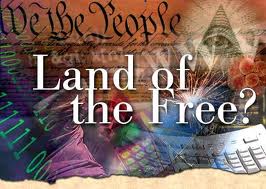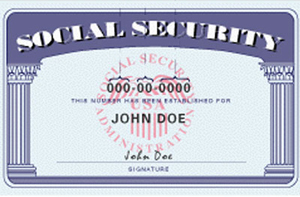Feds Coerce States to Demand Social Security Numbers
 When government enacts a law restricting a fundamental personal liberty, it must employ the least restrictive measures possible to achieve its goal. This test applies even when the government has a legitimate purpose in adopting the particular law. 1
When government enacts a law restricting a fundamental personal liberty, it must employ the least restrictive measures possible to achieve its goal. This test applies even when the government has a legitimate purpose in adopting the particular law. 1
The chilling effect of vagueness and over-broad coverage
The Federal Statute 42 USC 666 Section 13 requires that all states demand the Social Security Number from ALL license applicants. The abuse of this statute is that ALL citizens must pass an unnecessary litmus test, with some unable to comply due to civil rights concerns, rather than the target the very group that the law refers to.
There are least restrictive means to achieving the same goal, such as a national registry of dead-beat parents used to screen ONLY applicant's whose name is found on the list. The remaining corroborative documents already presented at the time of license application are sufficient to prove identity in case of duplicate names. Thus, the general public is not subject to unnecessary criminal scrutiny with a submission of private documents commonly used for identity theft, such as the Social Security Number.
The States' religious minorities face greater discriminatory practices because of the statute's vagueness and over-broad coverage, which precludes their ability to conform, and may result in unnecessary (yet necessary) spurious criminal activity due to the grave effect of such sanctions. It touches upon the very needs of citizens to travel to work and school, supply food and shelter for their families, and toward the pursuit of happiness.
The statute is grossly flawed because of it's "unlimited and indiscriminate sweep". 2
Title 42. The Public Health and Welfare

Chapter 7. Social Security Act
Title IV. Grants to States for Aid and Services to Needy Families with Children and for Child-welfare Services
Part D. Child Support and Establishment of Paternity
42 USC § 666 Requirement of statutorily prescribed procedures to improve effectiveness of child support enforcement
(a) Types of procedures required.
In order to satisfy section 454(20)(A) [42 USCS § 654(20)(A)], each State must have in effect laws requiring the use of the following procedures, consistent with this section and with regulations of the Secretary, to increase the effectiveness of the program which the State administers under this part [42 USCS § § 651 et seq.]:
(13) Recording of social security numbers in certain family matters.
Procedures requiring that the social security number of --
(A) any applicant for a professional license, driver's license, occupational license, recreational license, or marriage license be recorded on the application;
(B) any individual who is subject to a divorce decree, support order, or paternity determination or acknowledgment be placed in the records relating to the matter; and
(C) any individual who has died be placed in the records relating to the death and be recorded on the death certificate.
For purposes of subparagraph (A), if a State allows the use of a number other than the social security number to be used on the face of the document while the social security number is kept on file at the agency, the State shall so advise any applicants.
...
(16) Authority to withhold or suspend licenses.
Procedures under which the State has (and uses in appropriate cases) authority to withhold or suspend, or to restrict the use of driver's licenses, professional and occupational licenses, and recreational and sporting licenses of individuals owing overdue support or failing, after receiving appropriate notice, to comply with subpoenas or warrants relating to paternity or child support proceedings.
References
- Least Restrictive Means Test
- Shelton v. Tucker, 364 U.S. 479, 81 S. Ct. 247, 5 L. Ed. 2d 231 (1960)




42 USC 666 Analysis
The RFRA applies to federal statutes, such as: 42 USCS 666, which, at first review, appears to mandate the use of a national identification number. However, Section (a)(13) specifies "Recording of social security numbers in certain family matters". This applies only to parents with child support judgments in effect, not all U.S. citizens.
The federal government cannot prevent lawful citizens from obtaining state license privileges without due process, therefore no authority is given to withhold licenses from individuals exercising religious freedom.
American citizens cannot be made subject to child support enforcement procedures for crimes they have not committed; mandating unwarranted search and seizure of private information.
Subjection of all citizenry to 42 USCS 666(a)(13)(A) scrutiny:
Judicial review of HHS decision not to exempt state from requirement that it collect social security numbers on drivers' license applications in order to receive federal funds for child support enforcement, is inappropriate, based on reading of 42 USCS § 666(d) exemption provision, because language indicates Congress placed exemption decision solely within HHS discretion. Mich. Dep't of State v United States (2001, WD Mich) 166 F Supp 2d 1228.